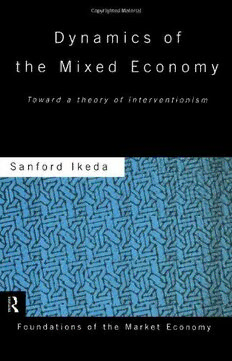
Dynamics of the Mixed Economy: Toward a Theory of Interventionism PDF
311 Pages·1996·0.832 MB·English
Most books are stored in the elastic cloud where traffic is expensive. For this reason, we have a limit on daily download.
Preview Dynamics of the Mixed Economy: Toward a Theory of Interventionism
Description:
Ludwig Von Mises said, in Human Action:
"The interventionist interlude must come to an end because interventionism cannot lead to a permanent system of social organization."
Mises went on to explain why, and expected in the end for all mixed economies to end as pure socialism or return to a free (unhampered) market economy. The observed fact that we see instead mixed economies everywhere is called the "Miseian paradox" by the author of this text. This text, after supporting Mises and the Austrian school's critique of mixed economies, proceeds to explain the dynamics of such economies, and how instead of necessarily ending up at one extreme or another, real economies can be expected go through a series of crises (much as we are seeing now) that cause a continuous cycling between collectivism and free markets. This is a kind of dynamic stability.
The text is interesting and illuminating. It does tend to drag on at times, but those parts that drag on for me may be fascinating for others. It doesn't offer any real hope for the world, except that if there was an exogenous shift in ideology toward free markets, we might then be able to maintain stability in the minimal state. Otherwise, we are stuck with what we got. Sad, but the arguments ring true.
See more
The list of books you might like
Most books are stored in the elastic cloud where traffic is expensive. For this reason, we have a limit on daily download.
